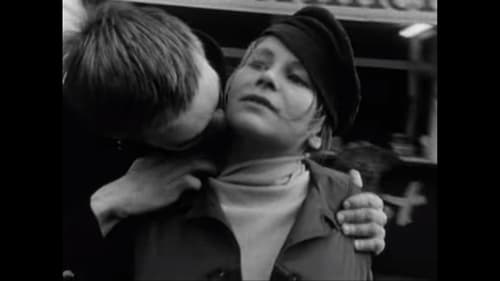
Cinematography
An African-American GI retires from the US Army in West Berlin to live with his (white) girlfriend, who already has a baby with another black man. After an argument with her family, she deserts him as well. Despite finding a job and a new place to live, he keeps running into racism, which also manifests itself in sexual intimidation.

Cinematography
Early dffb film by M. Ludin.

Cinematography
Short film.

Director
Skip Norman shot ‘On Africa’ after graduating from the German Film and Television Academy (DFFB). On the level of the image, we see tracking shots through West Berlin, information detailing the economic gains of colonialist exploitations, and photographs from West Africa, while the soundtrack shares facts about the continent’s conquest and decolonization. As Norman himself put it: “The starting point is the relationship between Europe’s prosperity and Africa’s poverty; Europe’s destruction of societies and cultures, and the simultaneous use of Christianity and racial theories as justification for a massive exploitation of the colonized.” ‘On Africa’ was first shown in 1970 and then broadcast on television by WDR in 1972. In 2020, the Harun Farocki Institut was able to digitize a 16mm print from the archive at the WDR.

Cinematography
German agitprop film.

Director
Recordings of a speech Bobby Seale held in Scandinavia intercut with roving streets and images.

Short experimental film by (and starring) Skip Norman dealing with racism, black/white relations, the blues.

Writer
Short experimental film by (and starring) Skip Norman dealing with racism, black/white relations, the blues.

Director
Short experimental film by (and starring) Skip Norman dealing with racism, black/white relations, the blues.

Cinematography
Ihre Zeitungen is a political film rooted in the 1968 student campaign against the Springer press group, which controlled popular dailies such as the Berliner Zeitung and the Bild Zeitung. Claiming the latter were manipulating public opinion, the students laid siege to the publisher's offices. These events made a strong impression on the German collective conscience, and it's in this context that Farocki made this "agit-prop" film.

Cinematography
Essay film about student protests in Berlin.

Director
A quiet scene in the snow, a black child in an anorak runs mumbling towards the camera. The pictures of Skip Norman's CULTURAL NATIONALISM (1968) are underpinned with a powerful monologue by the co-founder of the Black Panther Party Bobby Seale

Clearly influenced by Brecht and Jean-Marie Straub, criticizes the reduction of human relations to economic relations as well as the US imperialism in Vietnam.

Cinematography
One of the many films drawing a connection between Christmas and war. It is unclear whether the longing for a white Christmas is being taken seriously, or whether it is intended as a denunciation. In either event, America's war in Vietnam is denounced. (Harun Farocki)

Cinematography
Documentary by Helke Sander, in collaboration with Harun Farocki (among others), about the campaign of the West German New Left against the publishing house Springer, particularly its control and manipulation of the news.

Self
Scenes from Berlin: Kids playing football, a man tries to light a fire in his stove, a film team sets up a shot in a park, students discuss politics.

Camera Operator
A concise blast of feminist film making, Sander's first film is a tense yet playful four minute short that dissects a typical urban scene at a bus stop on a busy street in Berlin.











